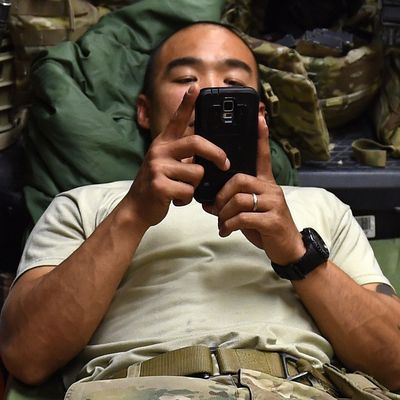
In these days of high anxiety over election security, with most jurisdictions going back to low-tech paper ballots and working to make the tabulation and reporting of votes significantly less hackable, West Virginia is trying something entirely counterintuitive, per a report from CNN:
West Virginians serving overseas will be the first in the country to cast federal election ballots using a smartphone app, a move designed to make voting in November’s election easier for troops living abroad.
It’s a limited pilot program, and the West Virginia secretary of State who is promoting it, Mac Warner, is smart to try it out on a category of voters difficult to mess with. The app, developed by a Boston company named Voatz (sure to be the butt of Twitter jokes if this somehow blows up), has apparently been tested in Rock & Roll Hall of Fame balloting and unspecified county primary voting in West Virginia:
Anyone using it must first register by taking a photo of their government-issued identification and a selfie-style video of their face, then upload them via the app. Voatz says its facial recognition software will ensure the photo and video show the same person. Once approved, voters can cast their ballot using the Voatz app.
Ballots are anonymized, the company says, and recorded on a public digital ledger called blockchain. Although that technology is most often associated with Bitcoin and other cryptocurrencies, it can be used to record all manner of data.
Election security experts are not real pleased with Warner’s experiment:
“Mobile voting is a horrific idea,” Joseph Lorenzo Hall, the chief technologist at the Center for Democracy and Technology, told CNN in an email. “It’s internet voting on people’s horribly secured devices, over our horrible networks, to servers that are very difficult to secure without a physical paper record of the vote.”
Marian K. Schneider, president of the election integrity watchdog group Verified Voting, was even more blunt. Asked if she thought mobile voting is a good idea, she said, “The short answer is no.”
West Virginia’s going to leave the decision about participating in this experiment (set to begin in November) to its counties. And the troops involved in it will continue to have the option of voting old-school with paper ballots.
Even if the technology is solid and the experiment so limited as to be relatively harmless (in all but very close elections), you have to figure there’s a chance the hackers of the world might take this as a direct challenge to their skills. If West Virginia troops serving overseas suddenly become a hotbed of support for minor parties or write-in candidacies (if that’s even possible on this app), we’ll know it’s time to take a closer look before we all get to vote on our phones.






























